ARTICLE AD BOX

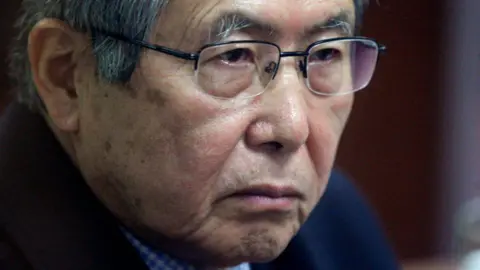 Reuters
Reuters
Alberto Fujimori was serving a prison sentence at the time of his death
The controversial former Peruvian president, Alberto Fujimori has died aged 86.
To his supporters, Fujimori was the president who saved Peru from the twin evils of terrorism and economic collapse.
To his opponents, he was an authoritarian strongman who rode roughshod over the country's democratic institutions to preserve his hold on power.
At the time of his death Fujimori was serving a 25-year jail sentence for human rights abuses committed during his time in office, including authorising killings carried out by death squads.
Surprise win
An agricultural engineer born of Japanese parents, Fujimori upset the odds when he won the Peruvian presidency in 1990 against Nobel Prize-winning author Mario Vargas Llosa.
Fujimori was a political unknown until weeks before the vote.
Fujimori: Rise and fall
- 1990: Wins a surprise victory at polls
- 1992: Dissolves Peru's congress with military backing, assuming greater control
- 1995: Restores congress and overwhelmingly wins a second term
- 2000: Re-elected for a third term amid allegations of ballot rigging
- 2000: Flees to Japan after Montesinos scandal breaks
- 2005: Detained in Chile at the Peruvian authorities' request
- 2007: Extradited from Chile to face trial in Peru
- 2007: Jailed for six years for abuse of power
- 2009: Convicted of human rights abuses, jailed for 25 years
- 2017: Pardoned on health grounds, prompting protests
- 2019: Sent back to prison after Supreme Court overturned pardon in 2018
- 2023: Released from prison
- 2024: Dies of tongue cancer
Few knew what to expect from him when he inherited a country on the verge of economic collapse and racked by political violence.
He implemented a radical programme of free-market reforms, removing subsidies, privatising state-owned companies and reducing the role of the state in almost all spheres of the economy.

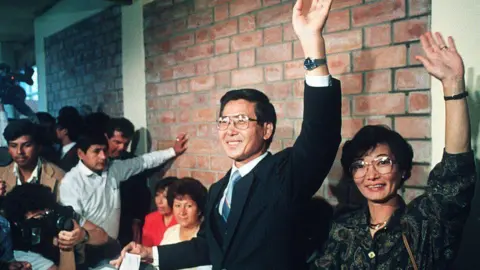 AFP
AFP
Alberto Fujimori was imprisoned for human rights abuses in 2009, however he said the charges were politically motivated
Though this shock therapy brought great hardship for ordinary Peruvians, it ended rampant hyperinflation and paved the way for sustained economic growth in the second half of the 1990s.
Fujimori also tackled the left-wing rebels whose 10-year insurgency caused thousands of deaths. But he says he never approved a "dirty war" against the rebels.
Move against congress
In 1992, with the support of the military, the president dissolved the Peruvian congress and courts and seized dictatorial powers.
He justified the measure by arguing that the legislative and judiciary had been hindering the security forces in their fight against the rebels.
Opposition politicians said he was really seeking to escape democratic accountability.
But that same year he was vindicated in the eyes of many Peruvians by the capture of the leader of the main rebel group, the Shining Path.
In 1995, Fujimori stood for re-election and won an overwhelming victory.

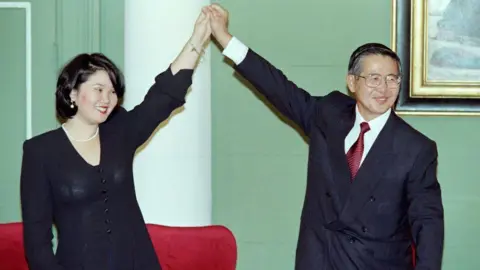 AFP
AFP
Alberto Fujimori's eldest daughter, Keiko, would later follow him into politics
Most voters cited his victories over left-wing insurgents and hyperinflation as the reason for giving him their support.
One of the key moments of his presidency was the hostage siege by Marxist MRTA rebels at the Japanese ambassador's residence in Lima in 1996-97.
After a four-month stand-off, commandos were sent in to take the building.
All 14 rebels were killed and nearly all the 72 hostages were rescued in an operation that at the time cemented Mr Fujimori's reputation of a man of action.
In his second term though, a growing number of Peruvians began to voice concern that the methods used against the insurgency were also being employed against the president's democratic opponents.
His critics accused him of using the intelligence service led by Vladimiro Montesinos to intimidate and spy on rivals.
They said he exerted unfair control on the media and the judiciary, and used government resources to support his own campaigns.
This criticism increased when he announced he was to stand for an unprecedented third successive term.
Start of downward slide
Although he won the May 2000 elections, the victory marked the start of his downfall.
A tape emerged showing Montesinos apparently bribing an opposition member of Congress.
After the scandal broke, the opposition gained control of Congress for the first time in eight years and dismissed Fujimori on grounds of "moral incapacity".
In November 2000, he fled to his parents' native Japan, where he lived for five years in self-imposed exile.

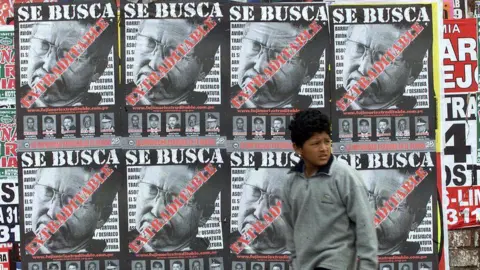 AFP
AFP
"Wanted" posters for the former president could be seen in Lima in 2003
In an effort to resurrect his political career and launch a new bid for the presidency, he flew to Chile in November 2005, only to be arrested at the request of the Peruvian authorities.
Fujimori then spent two years fighting to block his extradition to face a series of charges, a battle he lost in September 2007.
He was convicted and sentenced to six years in jail in December 2007 on charges of abuse of power, following the removal of sensitive video and audio tapes from Vladimir Montesinos's home.
In April 2009, judges found him guilty of authorising death-squad killings in two incidents known as La Cantuta and Barrios Altos, and the kidnapping of a journalist and a businessman.

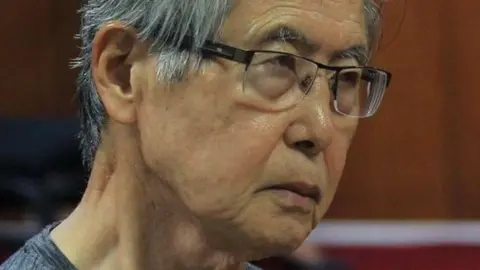 EPA
EPA
Alberto Fujimori remains a deeply divisive figure in Peru
Fujimori repeatedly denied the charges, saying they were politically motivated.
The 15-month trial and the divisions in public opinion it generated echoed the controversy that accompanied Fujimori throughout his political career.
Wedding in jail
He led a colourful personal life too.
During his time in office, Fujimori divorced his wife Susana Higuchi after dismissing her as first lady in favour of their daughter, Keiko.
Fujimori married his long-term Japanese girlfriend, Satomi Kataoka, whilst facing extradition for corruption and human rights abuses in a Chilean detention centre in 2006.

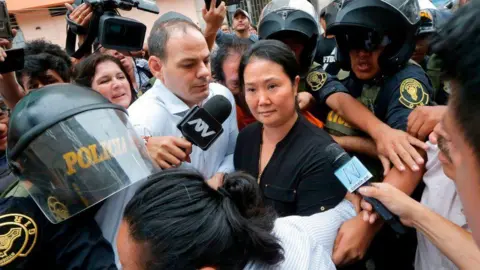 AFP
AFP
Keiko Fujimori (R) later encountered legal trouble of her own
Keiko Fujimori followed her father into politics, contesting the 2010 and 2016 Peruvian presidential elections.
As the candidate of the right-wing Popular Force party, Keiko Fujimori lost both of these elections narrowly.
The former first lady was initially widely tipped to win the 2016 election, but lost ground in the final stretch of campaigning to Pedro Pablo Kuczynski.
She was later jailed herself awaiting trial over allegations of corruption and money laundering.
Alberto Fujimori had been back in prison serving his sentence since January 2019, after the supreme court overturned an earlier controversial pardon.
He is survived by his wife and four children.

 4 months ago
22
4 months ago
22
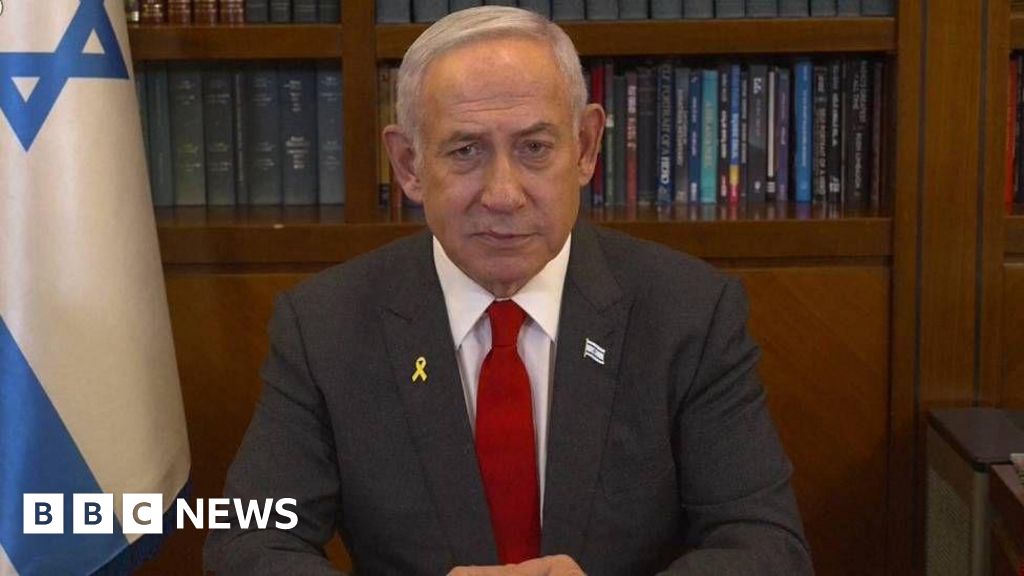
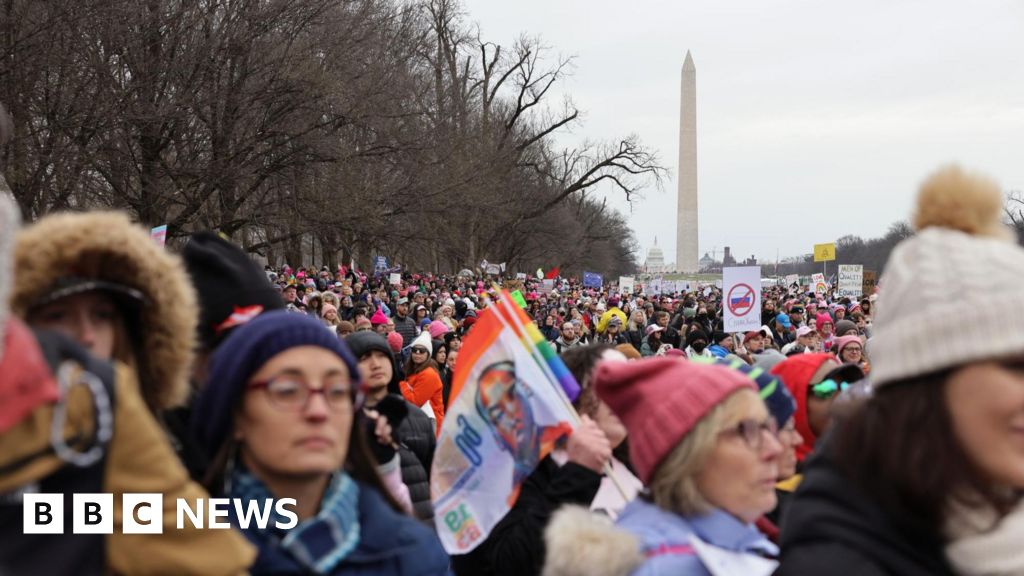
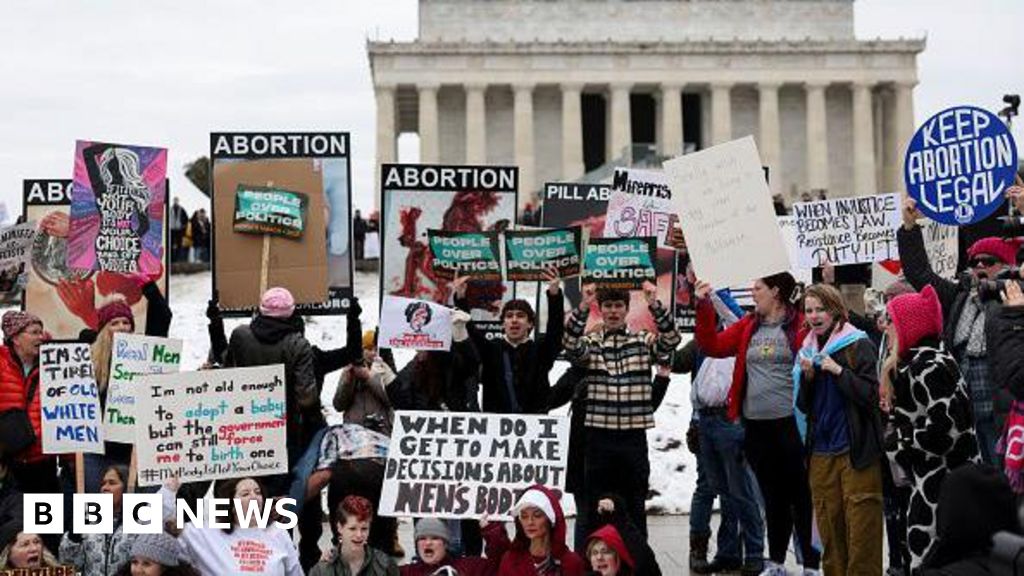





 English (US) ·
English (US) ·